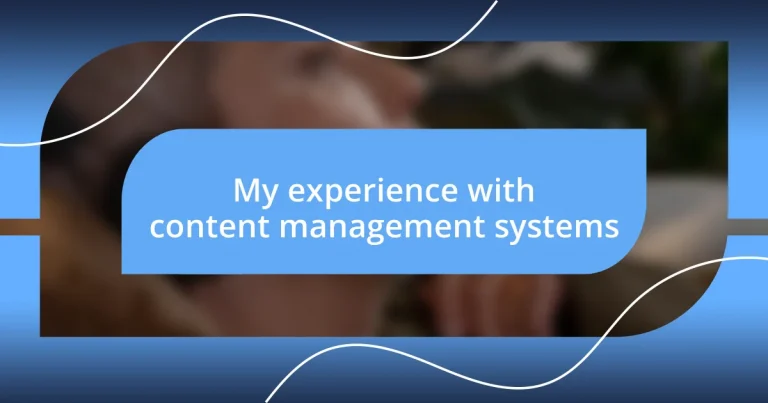Key takeaways:
- Choosing a CMS involves critical factors like user-friendliness, customization, integration capabilities, support, and scalability to ensure it meets current and future needs.
- Challenges in CMS usage include steep learning curves, compatibility with third-party tools, and limitations on customization, highlighting the importance of selecting the right system from the start.
- Effective management of a CMS entails using content calendars, regular team training, and leveraging analytics to enhance content strategy and user engagement.
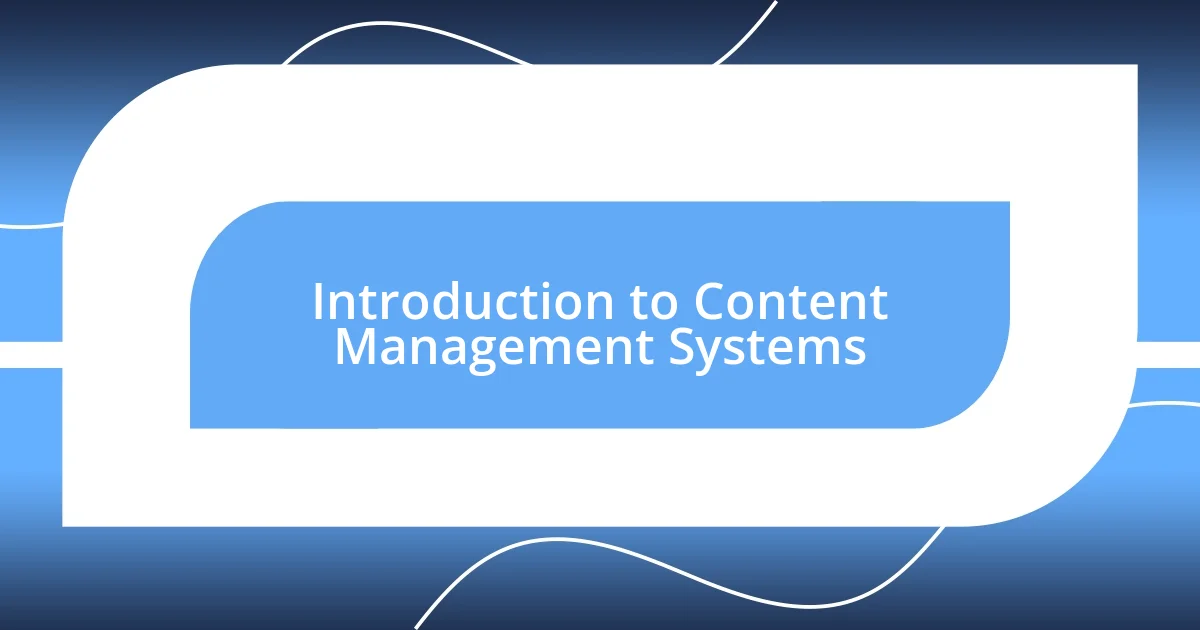
Introduction to Content Management Systems
Content Management Systems (CMS) serve as the backbone for digital content creation and management. I remember the first time I navigated a CMS; it felt like stepping into a digital toolbox brimming with possibilities. I was both excited and overwhelmed—what would I create first? A blog post or a portfolio?
One of the great things about CMS platforms is that they cater to a range of users, from tech-savvy developers to complete novices. Initially, I found myself marveling at how even someone with minimal technical skills can manage a website. It’s fascinating how these systems democratize content creation, enabling anyone to share their voice online.
What truly struck me is how a good CMS can streamline workflows and enhance collaboration. I recall working with a team on a project where different members could easily contribute, edit, and publish content in real-time. Have you ever experienced the frustration of emailing files back and forth? With a CMS, that hassle vanished, making our collaboration much more productive and enjoyable.
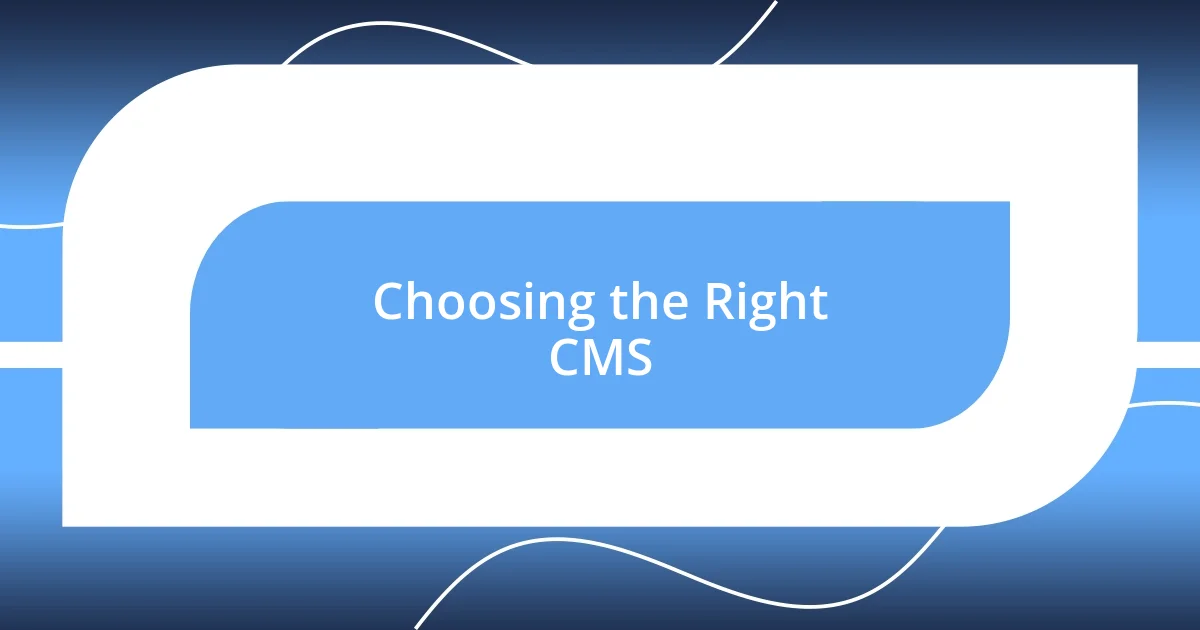
Choosing the Right CMS
Choosing the right content management system (CMS) can feel like a daunting task, especially with so many options available. I remember the overwhelming sense of choice when I first researched different platforms. I found that focusing on key features that aligned with my specific needs dramatically simplified the decision-making process.
Here are some essential factors to consider when selecting a CMS:
- User-Friendly Interface: Look for a platform that’s intuitive; I learned this the hard way when I chose a complex system that took weeks to master.
- Customization Options: Your brand deserves a unique touch. Having the ability to customize your site can truly make a difference.
- Integration Capabilities: Be sure the CMS can easily integrate with essential tools and plugins—you don’t want your site to be a digital island!
- Support and Documentation: I often relied on forums and tutorials. Don’t underestimate how valuable good support can be during tough times.
- Scalability: Think ahead; you’ll want a system that grows with your needs, avoiding the headache of having to migrate later on.
By considering these factors, I aimed to choose a CMS that not only met my current requirements but also had the potential to adapt as my projects evolved.
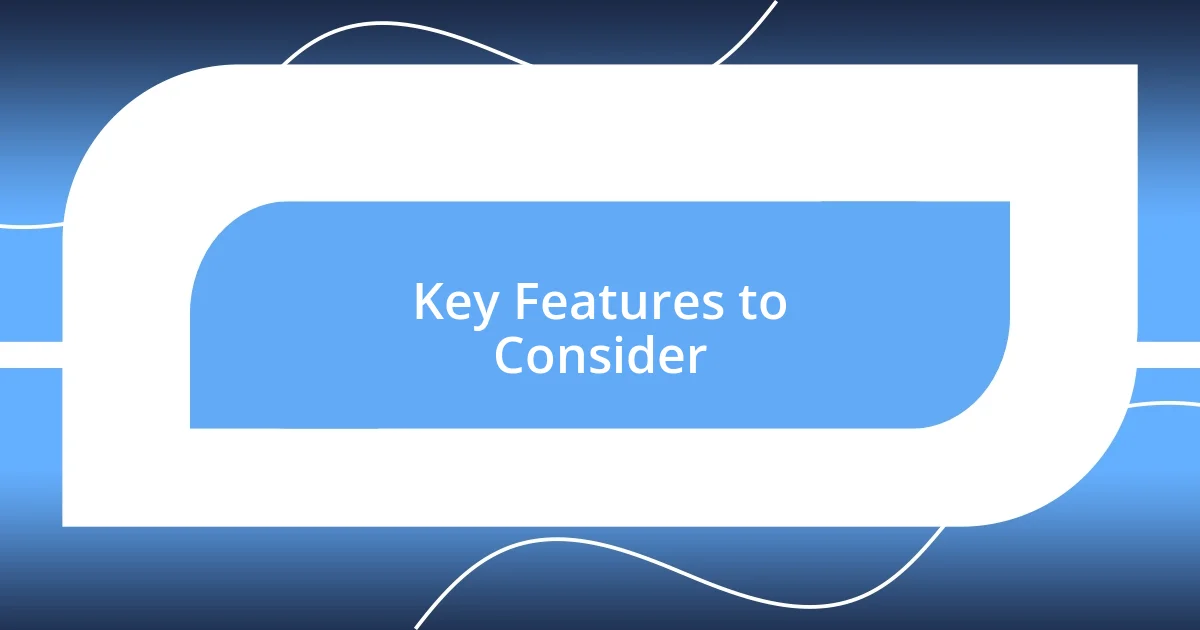
Key Features to Consider
When I first explored content management systems, I quickly realized that certain features could make or break my experience. One feature I felt was invaluable was the User-Friendly Interface. I recall spending hours trying to figure out a platform that was more complex than it needed to be. That frustration taught me to prioritize ease of use right from the start to avoid feeling overwhelmed.
Another critical element is Scalability. Early in my journey, I selected a CMS that was perfect for my initial project but soon discovered it couldn’t support my growing needs. That was a tough lesson! If I could do it again, I would choose a system that not only meets my current requirements but can also adapt as my projects evolve over time.
Lastly, I can’t stress enough how much Support and Documentation matters. In one instance, I hit a snag during a crucial project and turned to the platform’s forums, only to find a lack of helpful resources. I felt stranded! The right CMS should offer comprehensive, accessible support, whether through documentation, community forums, or direct assistance. These features combine to create a robust CMS experience that enhances productivity.
| Feature | Importance |
|---|---|
| User-Friendly Interface | Ensures ease of use for all skill levels |
| Scalability | Allows growth with your projects |
| Support and Documentation | Provides necessary assistance during challenges |
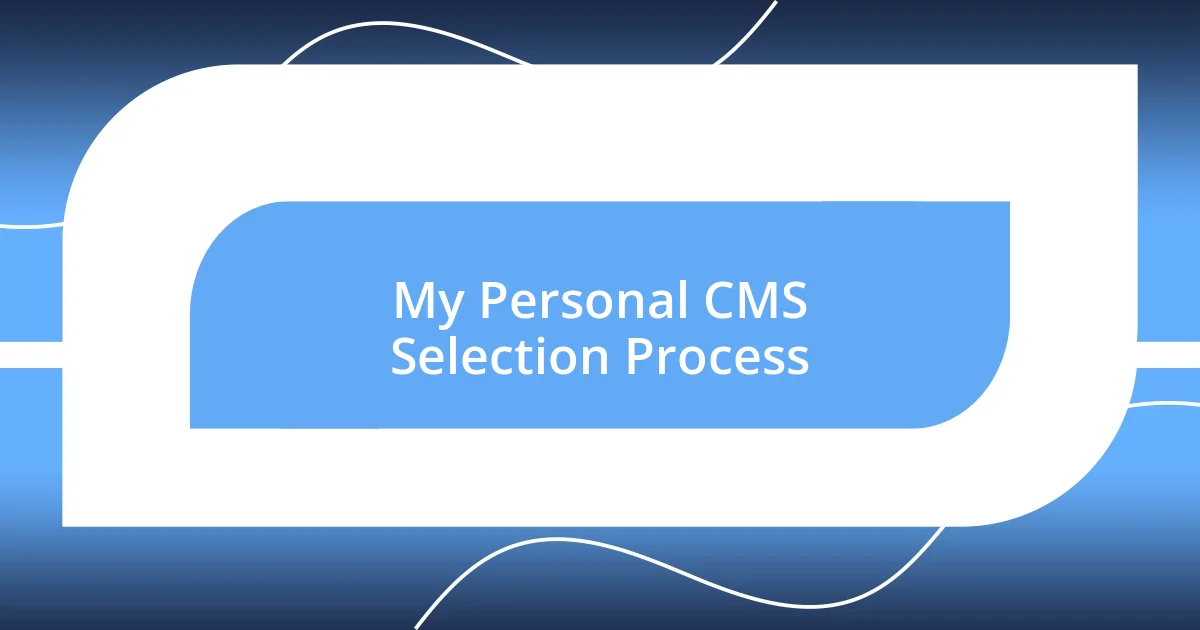
My Personal CMS Selection Process
When it was time for me to select my CMS, I took quite a few approach detours. I vividly recall testing a highly recommended platform that boasted an impressive feature set, only to find myself lost in a sea of settings and functionalities. Does anyone else remember the frustration of watching countless tutorial videos, feeling like you’re trying to decipher an alien language? It was during that struggle that I promised myself to prioritize user-friendly options from then on.
I also learned the hard way how essential integration capabilities are. I once picked a CMS that seemed perfect until it became clear that it wouldn’t play nicely with my existing marketing tools. Imagine my disbelief when I realized I’d have to manually transfer data weekly! That experience underscored how vital it is for a CMS to create a seamless ecosystem for all the tools that assist in running a successful site.
Scalability has been another game changer for me. I initially overlooked this factor, thinking I could manage any future growth with ease. But let me tell you, when my traffic surged due to a successful campaign, my chosen CMS couldn’t keep up! It felt like watching my dreams unravel in real-time. That daunting moment taught me that planning for the future isn’t just a luxury; it’s a necessity.
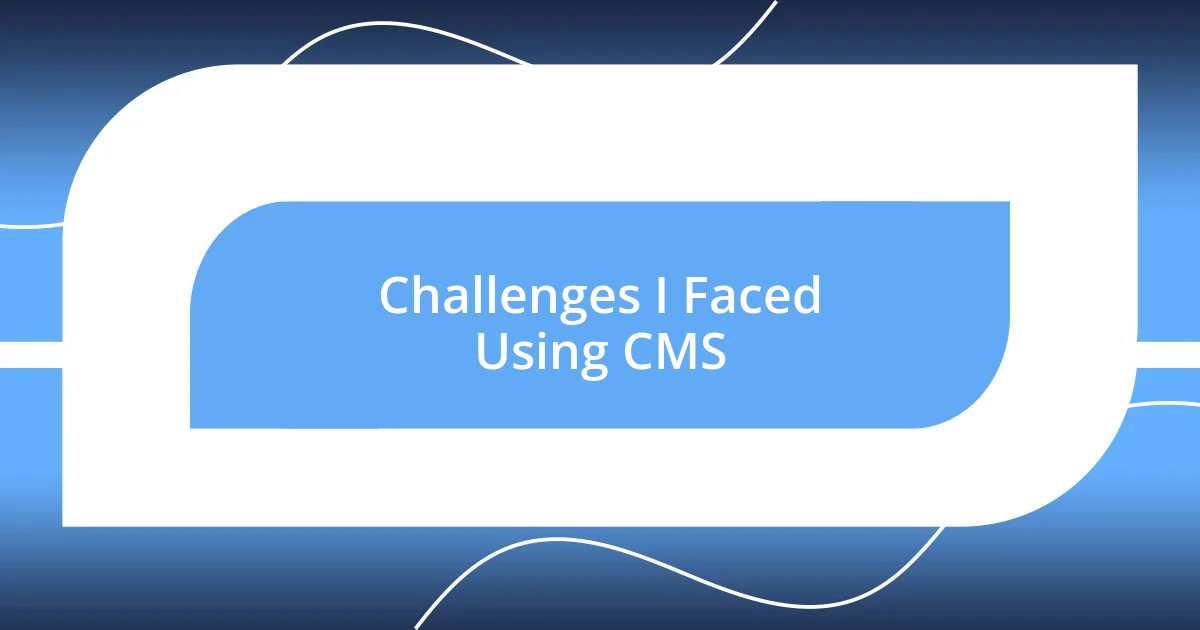
Challenges I Faced Using CMS
Navigating the world of content management systems came with its fair share of obstacles. One challenge I often faced was the steep learning curve of certain platforms. I remember sitting in front of my computer, staring at a dashboard filled with features I couldn’t decipher. It felt a bit like being dropped into a foreign country without a map. I quickly learned that while some systems are powerful, they can be intimidating, and it’s essential to find one that balances features with usability.
Another hurdle was the issue of compatibility with third-party plugins. I once integrated a popular SEO tool with my CMS, thinking it would streamline my workflow. Instead, I spent a whole weekend battling with errors and glitches. It was frustrating to realize that not all platforms are built to work seamlessly with external tools. The experience taught me to always investigate how well a CMS collaborates with existing applications before making a commitment.
Lastly, I encountered limitations regarding customization. There was a time when I wanted to tweak my site’s design to make it truly reflect my brand identity. I felt disappointed when I discovered that the CMS I chose had strict templates, leaving little room for personal flair. I often pondered, “Why did I compromise on this?” It reinforced the idea that finding a CMS that allows for sufficient flexibility is crucial for any project that needs to stand out.
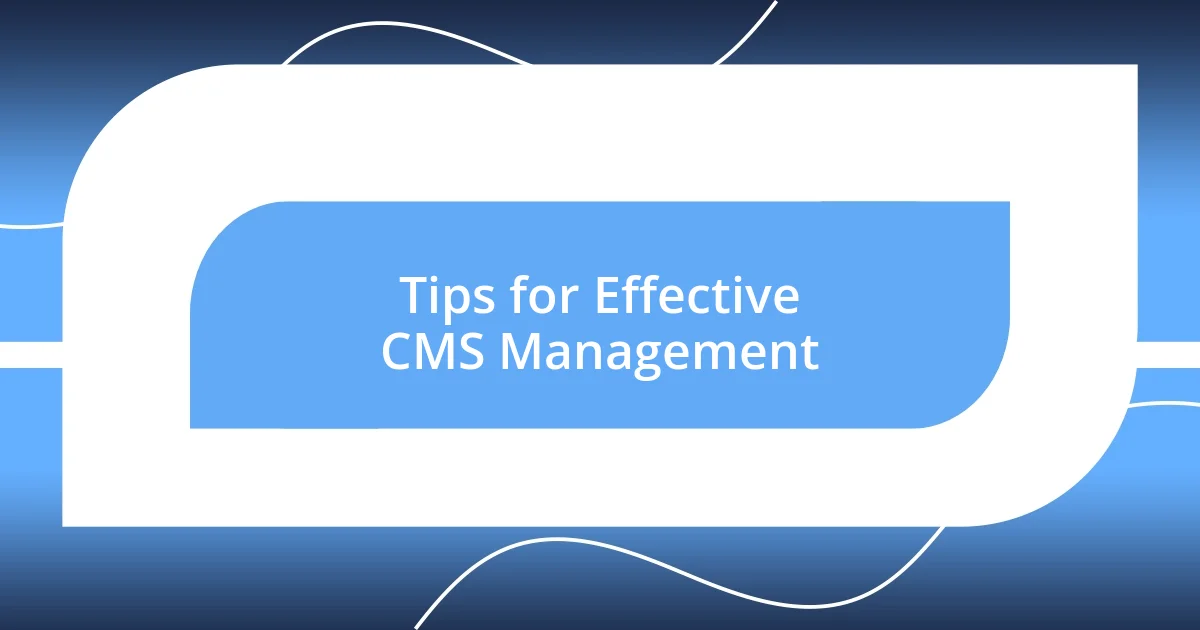
Tips for Effective CMS Management
Effective CMS management is all about organization and planning. I’ve found that having a clear content calendar makes all the difference. Without it, I often found myself scrambling to keep up with publishing schedules and lost track of essential updates. Ever feel like you’re just reacting instead of being proactive? A content calendar helps me stay on track and simplifies the workflow—making the process feel less like a chore and more like an intentional strategy.
Another tip I can’t stress enough is regular training for your team. I remember having to pull late nights to troubleshoot issues that could’ve been easily avoided with a little knowledge. Investing time in training sessions not only boosts confidence among team members but also enhances collaboration. It’s amazing how a brief workshop can open up new insights and reduce those “oops” moments that accompany miscommunication.
Finally, don’t underestimate the power of analytics. In my early days, I focused on creating content without paying much attention to performance metrics. It wasn’t until I reviewed my analytics that I realized certain topics resonated far more with my audience than others. Ask yourself, “What do my users truly value?” Diving into analytics not only helps you tailor your content but can also transform your CMS management into a more strategic endeavor. It’s all about using data to inform your decisions and foster a deeper connection with your audience.
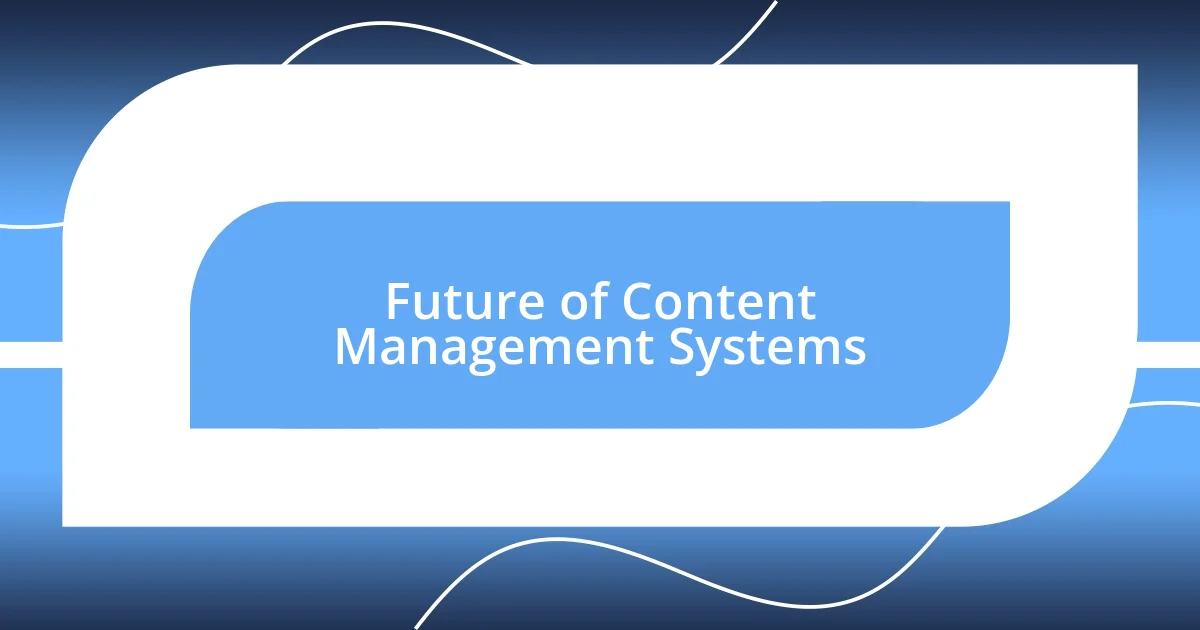
Future of Content Management Systems
As I look toward the future of content management systems, I see a landscape that’s not just evolving, but revolutionizing. AI integration is becoming increasingly prevalent, allowing for smarter content personalization. Have you ever wondered what it would be like if your CMS could predict user preferences before they even realized them? It’s thrilling to think of a system that adapts dynamically, creating a tailored experience for every visitor.
Another exciting trend is the shift towards headless CMS solutions. In my experience, working with traditional systems sometimes felt like driving a car with the brakes on; there was always that heaviness of limitation. Headless CMS designs decouple the backend from the frontend, which means developers can go wild with creativity! Imagine building a website that seamlessly connects to various platforms without being constrained by a single template. How liberating would that be?
Finally, collaboration features are set to take center stage. I often found that effective teamwork is at the heart of any successful content strategy. With real-time editing and communication tools becoming standard in CMS, the future looks promising for teams wanting to streamline their efforts. Do you remember the chaos of chasing down different document versions? Thankfully, future CMS will help eliminate those headaches, allowing for more productive and cohesive workflows.












